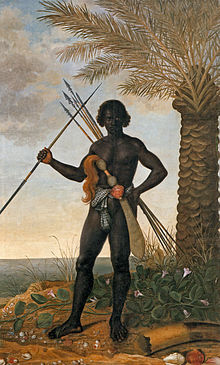Ganga Zumba
| Ganga Zumba | |
|---|---|

Dutchman Albert Eckhout's Painting of an Afro-Brazilian Warrior From the same time of Ganga Zumba
|
|
| King of Quilombo dos Palmares | |
| Predecessor | Princess Aqualtune (Mother), Princess of Kongo |
| Successor |
Ganga Zona (Brother)(de jure) Zumbi dos Palmares (Nephew) (de facto) |
| Born | Ganga Zumba, ca. 1630 Kingdom of Kongo, Africa |
| Died | 1678 Cucaú Valley, Portuguese Colony of Brazil |
| Spouse | three wives |
| House | Kongo |
| Occupation | Prince in Africa, Slave, warrior, King of Palmares in Brazil |
Ganga Zumba (Portuguese pronunciation: [ˈɡɐ̃ɡɐ ˈzũbɐ]) was the first leader of the massive runaway slave settlement of Quilombo dos Palmares, or Angola Janga, in the present-day state of Alagoas, Brazil. Zumba was a slave who escaped bondage on a sugar plantation and eventually rose to the position of highest authority within the kingdom of Palmares, and the corresponding title of Ganga Zumba. Although some Portuguese documents regard Ganga Zumba as his proper name, and this name is widely used today, the most important of the documents translates the name as "Great Lord." In Angolan, nganga a nzumbi was "the priest responsible for the spiritual defense of the community" which was a kilombo or military settlement made up multiple groups. A letter written to him by the governor of Pernambuco in 1678 and now found in the Archives of the University of Coimbra, calls him "Ganazumba," which is a better translation of "Great Lord" (in Kimbundu).
Ganga is said to have been the son of princess Aqualtune, daughter of an unknown king of Kongo. She led a battalion at the Battle of Mbwila. The Portuguese won the battle, eventually killing 5,000 men and capturing the king, his two sons, his two nephews, four governors, various court officials, 95 title holders and 400 other nobles, who were put on ships and sold as slaves in the Americas. It's likely that Ganga was among these captives. The whereabouts of the rest of them is unknown. Some are believed to have been sent to Spanish America, but Ganga Zumba, his Brother Zona and his sister Sabina (mother of Zumbi dos Palmares, his nephew and successor) were made slaves at the plantation of Santa Rita in the Portuguese Captaincy of Pernambuco in what is now northeast Brazil, which at the time was controlled by the Dutch. From there they escaped to Palmares.
A quilombo or mocambo was a refuge of runaway slaves who were forcibly brought to Brazil (mainly from Angola) that escaped their bondage and fled into the interior of Brazil to the mountainous region of Pernambuco. As their numbers increased, they formed maroon settlements.
...
Wikipedia
